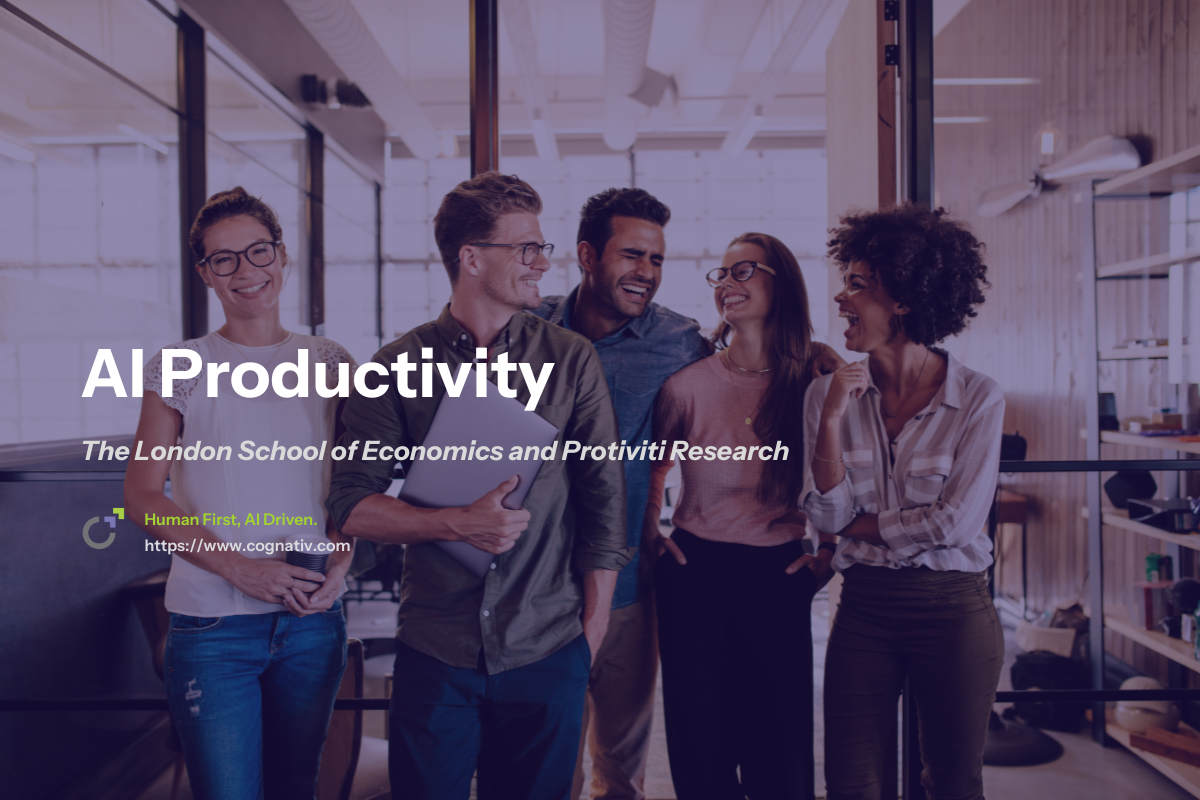AI Boosts Productivity One Workday Per Week: The London School of Economics and Protiviti Research
Artificial intelligence (AI) save significant hours per week by enabling employees to complete the same tasks more efficiently. Recent and relevant training in AI skills is key to closing the AI training gap and achieving organisational gains. This article explores how inclusive AI teams and multidisciplinary teams drive stronger outcomes, based on Protiviti research London and the Inclusion Initiative at the London School of Economics.
Key Takeaways
-
AI boosts productivity by the equivalent of one workday per week, saving an average of 7.5 hours per week per employee.
-
Closing the AI training gap with recent and relevant training is the decisive factor in AI adoption success, not generation.
-
Generationally diverse teams and inclusive AI teams outperform, driving stronger team outcomes and substantial efficiency gains.

Introduction to Artificial Intelligence and Its Impact on Productivity
Artificial intelligence (AI) has rapidly transformed the modern workplace, emerging not just as another tool but as a catalyst for redefining how organizations operate, innovate, and compete. According to recent research conducted by the London School of Economics' Inclusion Initiative (TII) in collaboration with global consulting firm Protiviti, AI boosts productivity by the equivalent of one workday per week. This translates into an average savings of 7.5 hours per employee weekly, which equates to approximately $18,000 (£14,000) in annual productivity gains per worker.
The study underscores that AI adoption is not limited to any single generation; rather, it is the receipt of AI skills training that determines AI success contrary to popular belief that younger generations such as Gen Z employees dominate AI usage. This report sheds light on the critical importance of closing the AI training gap, fostering inclusive AI teams, and embedding AI productively within organizations to achieve substantial efficiency gains.

The Economics of AI Adoption: Findings from the Inclusion Initiative
The Inclusion Initiative at the London School of Economics, led by Dr. Grace Lordan, Associate Professor in Behavioural Science and a renowned research officer, spearheaded this comprehensive study. The initiative brings together a multidisciplinary team to understand how inclusion and productivity intersect at the team and organizational levels.
Their research reveals that while AI users save significant work hours, a staggering 68% of employees received no AI skills training in the past 12 months. This gap in training represents a missed opportunity for businesses to harness the full potential of AI initiatives. The economics of AI adoption clearly indicate that investing in recent and relevant AI training is one of the fastest ways for companies to unlock measurable returns, drive sharper decision-making, and accelerate innovation.

AI Training Gap: A Barrier to Achieving Greater Productivity Benefits
Despite the clear productivity gains, the AI training gap remains a critical challenge. Most employees have not received AI training recently, which limits their ability to use AI effectively. The report highlights that AI skills training—not generation—is the decisive factor in determining AI success. Employees who have received AI skills training demonstrate higher efficiency and are better equipped to deliver AI initiatives that drive organizational gains.
Closing this gap requires a strategic approach involving managed solutions that integrate AI training into everyday workflows. Protiviti, a global leader in consulting, emphasizes that organizations embedding AI into their operations while redesigning roles to focus on higher-value work empower employees to experiment confidently with AI tools. This approach not only improves productivity but also prepares companies for the next wave of technological change.

The Power of Inclusive AI Teams and Multigenerational AI Project Teams
One of the standout findings from the research is that inclusive AI teams outperform those with low generational diversity. Multigenerational AI teams, comprising Gen Z employees, Gen X employees, and other age groups, foster collaboration and leverage deep business experience across generations. This diversity drives stronger team outcomes and increased employee commitment.
The study shows that 77% of employees in multigenerational AI project teams reported their teams as productive, compared with only 66% in teams with low generational diversity. Creating multigenerational AI teams is not just a diversity initiative; it is a strategic business imperative that helps organizations deliver AI initiatives more effectively and achieve substantial efficiency gains.
Productivity Comparison Between AI Teams Based on Generational Diversity
|
Team Type |
Percentage Reporting High Productivity |
|---|---|
|
Multigenerational AI Teams |
77% |
|
Low Generational Diversity AI Teams |
66% |

AI Exposure and Its Role in Driving Efficiency Counts
AI exposure within organizations plays a pivotal role in achieving productivity gains. Employees with higher AI exposure report increased work hours saved and greater efficiency. The research shows that AI exposure is closely linked with helping employees engage productively with AI tools, which fosters collaboration and drives stronger team outcomes.
Importantly, AI is not just another tool; it is a transformative force that enables business leaders to confidently face future challenges by delivering deep expertise and objective insights. Organizations that recognize this and invest in embedding AI effectively across their workflows are better positioned to achieve organizational gains and mitigate talent-related risks.

Talent-Related Risks and the Importance of AI Skills Training
Talent-related risks, including the availability of skilled labor to leverage emerging technologies, rank among the top challenges for executives, according to Protiviti’s 2025 Executive Perspectives on Top Risks Survey. The research highlights that investing in AI skills training across generations reduces these risks by equipping employees with the necessary capabilities to use AI productively.
Moreover, training helps prepare companies to manage the evolving landscape of work by addressing work-life balance concerns and ensuring that employees can maintain motivation and job satisfaction while leveraging AI tools. This preparation is crucial for reducing turnover and fostering a sustainable work environment.

The Role of Behavioural Science and Multidisciplinary Teams in AI Implementation
Successful AI implementation requires a multidisciplinary approach that combines expertise in AI technology, business strategy, and behavioural science. The Inclusion Initiative’s team, including research officers specializing in behavioural science, demonstrates that understanding human factors is essential for delivering AI initiatives that resonate with employees and drive adoption.
Behavioural insights help organizations design AI training programs that are relevant and recent, enabling employees to engage effectively with AI and achieve greater productivity benefits. This holistic approach ensures that AI adoption is inclusive and that diverse AI teams can thrive.

Virtual Launch Event and Preliminary Report Findings
To disseminate these important insights, the London School of Economics and Protiviti hosted a virtual launch event presenting the preliminary report findings. This event provided a platform for business leaders, AI practitioners, and researchers to explore the implications of the study and discuss strategies for closing the AI training gap.
The event emphasized the urgency of addressing AI training disparities and highlighted best practices for delivering AI initiatives that maximize productivity gains. Attendees gained valuable perspectives on how to create inclusive AI teams and embed AI effectively within their organizations.

AI Adoption Across Sectors: Government Agencies and Beyond
While much of the focus is on private enterprises, government agencies also stand to benefit significantly from AI adoption and skills training. Protiviti’s managed solutions extend to public sector organizations seeking to modernize operations and improve service delivery through AI.
By equipping government employees with AI skills and fostering inclusive AI teams, public institutions can drive increased employee commitment and achieve organizational gains similar to those seen in the private sector. This cross-sector applicability underscores the broad impact of AI on work hours and productivity.

Preparing for the Future: Embedding AI and Leveraging Emerging Technologies
Looking ahead, organizations must view AI not just as an add-on but as an integral part of their strategic framework. Embedding AI involves redesigning roles, fostering a culture of continuous learning, and leveraging emerging technologies to achieve sustainable productivity improvements.
Protiviti’s global leadership in AI consulting and the London School of Economics’ research provide a roadmap for companies to prepare for the future. This includes addressing talent-related risks, closing the AI training gap, and creating diverse AI teams that can deliver AI initiatives effectively.

Driving Organizational Success Through Inclusive and Effective AI Adoption
The evidence is clear: AI boosts productivity by the equivalent of one workday per week, but realizing these gains depends on closing the AI training gap and fostering inclusive, multigenerational AI teams. Organizations that invest in recent and relevant AI skills training, embed AI productively into workflows, and leverage behavioural science insights will drive stronger team outcomes and achieve greater organizational gains.
As AI continues to reshape the workplace, business leaders must act now to equip their employees with the skills to use AI effectively. Doing so not only prepares companies for the next wave of change but also ensures that efficiency counts and that talent-related risks are mitigated.
For organizations ready to embrace this future, the partnership between the London School of Economics’ Inclusion Initiative and Protiviti offers invaluable insights and managed solutions to help leaders confidently face the challenges and opportunities of artificial intelligence.

References:
-
London School of Economics’ Inclusion Initiative (TII) and Protiviti Research Report: Bridging the Generational AI Gap: Unlocking Productivity for All Generations, 2025.
-
Protiviti 2025 Executive Perspectives on Top Risks Survey.
-
Virtual Launch Event on AI Training and Productivity, October 28, 2025.
This article is brought to you by Cognativ, a leader in AI-First architecture and custom software development, delivering secure, scalable digital transformation solutions across industries including fintech, healthcare, manufacturing, and telecom.


